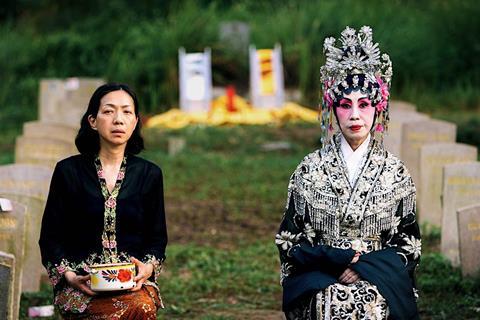Festival heavyweight revisits the tragic race riots that occured in Kuala Lumpur on May 13, 1969

Dir: Chong Keat Aun. Malaysia/Singapore/Taiwan. 2023. 116mins
Chong Keat Aun’s second feature Snow in Midsummer revisits the tragic events that occurred in the Malaysian capital of Kuala Lumpur on May 13, 1969. A race riot erupted in the aftermath of a national election that saw Chinese-dominated opposition parties achieve significant gains at the expense of the pro-Malay coalition that had ruled the country since its independence. Malay mobs took to the streets in areas with Chinese and Indian-owned properties; order was only restored through martial law. Official government reports put the death toll at 196, but other sources estimate it was closer to 600. The riots were a culmination of various disputes between Malays and Chinese groups, yet Chong’s somber film does not strive to provide context. Rather, it adopts a two-chapter structure to chronicle the experience of a particular family caught in the chaos and examine the trauma that still defines the life of one member.
Chong’s refusal to address history in didactic terms means there is much to admire
Snow in Midsummer received its world premiere at the Venice Film Festival and will make its Asian bow at the Golden Horse Film Festival as part of an opening double bill with Hwarng Wern-ying’s family drama Be with Me. This is Chong’s follow-up to his acclaimed debut The Story of Southern Islet (2020) which earned him Best New Director honors at the 57th Golden Horse Awards; Snow In Midsummer has this year received nine nominations. Although it should solidify Chong’s standing on the festival circuit, this latest work may prove a tough sell commercially due to measured pacing, subject matter that remains little known outside Malaysia and metaphoric uses of Chinese opera. That said, the estimable quality of Chong’s filmmaking may inspire an art-house distributor to rise to the challenge.
The first chapter occurs on that fateful day in 1969, with schoolgirl Eng (Lim Koet Yenn) and her mother Su-mei (Pauline Tan) at its centre. Although the harrowing events are foreshadowed by radio coverage of the election and Eng revealing to her mother that she is being bullied by her Malay classmates, life in general seems stable in the capital. Eng and her mother watch a Cantonese opera at a temple in the Chinese enclave; meanwhile, her father Kooi (Peter Yu) and brother Yeow (Teoh Wei Hern) visit the Majestic Theater to enjoy a Taiwanese movie. When news of rapidly escalating post-election discontent spreads, Su-mei and Eng take refuge with the theatre troupe. The family is never reunited.
Jumping forward to 2018, the second chapter finds the middle-aged Eng (Wan Fang) living a life of quiet domesticity in Penang. Despite her best efforts, Eng’s now deceased mother never managed to find the graves of Kooi and Yeow as the victims were mostly buried in unmarked graces. After reading a newspaper article about a soon to be demolished ’513 cemetery’, Eng travels to Kuala Lampur on the anniversary of the riots to resume her mother’s quest.
The first chapter of Snow in Midsummer is sure to draw comparison to Hou Hsiao-hsien’s socio-historical epic A City of Sadness (1989) due to its intimate perspective on an event which ruptured a country’s social-political fabric. Chong spends a good half hour establishing everyday life in 1960s Kuala Lumpur with an emphasis on its blend of traditional and cosmopolitan elements. The activities of Eng’s family are interwoven with those of food sellers, temple worshippers and the theatre troupe as it prepares for an evening performance. This opening stretch unfolds as a handsome exercise in period recreation, although awareness of historic events adds a growing sense of dread.
It also establishes Chong’s vantage point with wide shots and low camera angles keeping characters at a distance so as not to intrude on their last gasp of normalcy or the impending reservoir of pain.
When the riot breaks out, Chong’s focus on Eng’s ordeal as she huddles with her mother backstage means that bloodshed is largely absent. Instead, the viewer is left to imagine the carnage based on petrified facial expressions and immersive sound design by Tu Duu-Chih and Wu Shu-Yao which creates frissons with its distressing mix of off-screen destruction, gunfire and panicked screams. Chong’s framing is at its most impactful when the troupe leader (Pearlly Chua) pounds on the locked door of the Majestic Theater to alert the crowd, only for her cries to be drowned out by the movie playing inside. The fixed shot sees her dwarfed by the grand building, illustrating the agonising futility of individual effort in the face of mass violence.
Responses to Snow In Midsummer may depend on how viewers feel about its themes of loss, memory and inter-generational trauma being filtered through other works. If the first chapter recalls Hou, the second is clearly in thrall to Apichatpong Weerasethakul’s Cemetery Of Splendor (2015) with its muted green palette and a catharsis at a graveyard where a grinding mobile excavator refuses to allow the dead to rest.
Then there is Chong’s integration of the opera ’Snow In June’, parts of which are performed across the two chapters. The play’s title suggests an inexplicable event and its narrative involves the unjust execution of an innocent protagonist, thereby serving as a commentary on the May 13 incident but also creating further distance that blunts the film’s power. Nonetheless, Chong’s refusal to address history in didactic terms means there is much to admire in this meticulously crafted cinematic remembrance.
Production companies: Janji Pictures, August Pictures, Swallow Wings Films, Southern Islet Pictures
International sales: Swallow Wings Films, pacificoceansy@gmail.com
Producer: Wong Kew Soon
Screenplay: Chong Keat Aun
Cinematography: Hsu Chih-Chun
Production design: Chiang Bao Shan
Editing: Goh Ai Chen
Music: Yii Kah Hoe, Chong Keat Aun
Main cast: Wan Fang, Pearlly Chua, Pauline Tan, Rexen Cheng, Peter Yu, Lim Koet Yenn, Teoh Wei Hern, Alvin Wong, Teo Siew Chin
























